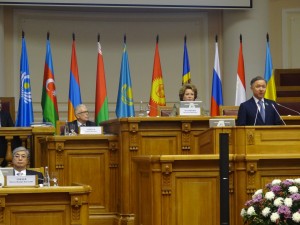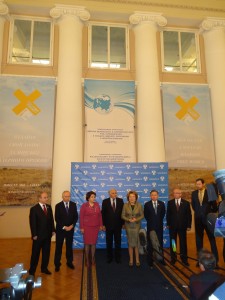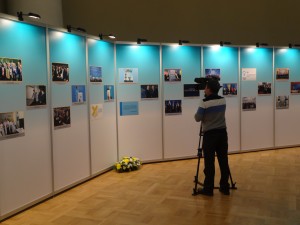 SAINT PETERSBURG, Nov. 29 – Parliamentary leaders and deputies from the Commonwealth of Independent States (CIS) and beyond came together today in this city’s historic Tauride Palace for an international conference focusing on nuclear security in the modern world and seeking ways to advance the cause of global nuclear disarmament.
SAINT PETERSBURG, Nov. 29 – Parliamentary leaders and deputies from the Commonwealth of Independent States (CIS) and beyond came together today in this city’s historic Tauride Palace for an international conference focusing on nuclear security in the modern world and seeking ways to advance the cause of global nuclear disarmament.
On an unusually warm and sunny day for a city known as the City of Rain, speakers and deputy speakers of parliaments from Azerbaijian, Armenia, Belarus, Kazakhstan, Kyrgyzstan, Russia, Tajikistan, Ukraine and other countries explored various ideas to give an additional impetus to efforts to promote a nuclear weapons free future, including Kazakhstan’s initiative, the ATOM Project.
Speaker of the Mazhilis (lower house) of Kazakhstan’s Parliament Nurlan Nigmatulin read out a welcoming message by President Nursultan Nazarbayev who underscored his country’s tragic legacy of nuclear weapons testing and stressed the importance of redoubling international efforts to promote global nuclear disarmament against modern challenges. President Nazarbayev also stressed the importance of further promotion of the efforts of the ATOM Project, which already attracted wide international attention.
The conference, organized jointly by the CIS Interparliamentary Assembly and Kazakhstan’s Mazhilis, concluded with a final document which covered a range of initiatives and specifically stressed the importance of the early entry into force of the Comprehensive Nuclear Test Ban Treaty (CTBT). It called on states on whom its entry into force depends to promptly sign and ratify the treaty, and welcomed efforts aimed at achieving this goal including the ATOM Project.
Today, CTBT entry into force depends on its signature and ratification by China, Egypt, India, Iran, Israel, Democratic People’s Republic of Korea, Pakistan and the United States. It was signed by 183 countries and ratified by 161, including three recognized nuclear weapon states, France, Russia, and the U.K.
In the conference’s final document, expressed conviction that all modern threats to nuclear non-proliferation should be removed based on the international law and keeping the balance of the three main components of the Treaty on Non-Proliferation of Nuclear Weapons (NPT) – disarmament, non-proliferation and peaceful use of nuclear energy.
More than 500 participants took part in the conference including members of Parliaments, representatives of CTBTO, the Interparliamentary Union, as well as the Pan-African Parliament and the International Committee of the Red Cross and Red Crescent, non-proliferation experts as well as university students.
In the final document, they called on all states to take efforts to strengthen the regime of nuclear non-proliferation and disarmament, including through ensuring the universalization of NPT and fulfilling all obligations contained in it.
The final document also recognized “the aspiration of the Republic of Kazakhstan to give an additional impetus to the process of reduction and limitation of nuclear weapons through the adoption within the UN of a Universal Declaration of a Nuclear-Weapons Free World.”
The document noted the importance of the 2010 treaty between Russia and the U.S. further reducing and limiting strategic offensive armaments and called on countries possessing nuclear weapons to follow their example.
Participants also welcomed the initiatives to activate meaningful activities of the UN Conference on Disarmament in Geneva which has been all but stalled since 1996. Recently, one such initiative was the one-year effort by UN Open-Ended Working Group on taking forward multilateral nuclear disarmament negotiations which presented its findings to the UN General Assembly in September 2013.
The participants of the conference in Saint Petersburg further called on all states to prevent the acquisition of nuclear materials and technoligies by terrorists, and noted the importance of continued implementation of the Global Initiative to Combat the Acts of Nuclear Terrorism.
The conference also welcomed initiatives and practical steps to establish and expand of zones free from nuclear weapons across the world, and called for the early convocation of a Conference on the establishment in the Middle East of a zone free from nuclear and other types of weapons of mass destruction. The participants called on all states of the Middle East to take the most active and constructive participation in the preparation and conduct of this important event prescribed by the decisions of the NPT Review Conference in 2010.
Turning towards the activity of the Interparliamentary Assembly of the CIS, they pledged to continue to work towards creating a model legislative base aimed at ensuring the control over radiation materials, chemical and biological security and at countering nuclear terrorism. Finally, the participants called on parliamentarians of all states to join efforts and become one of the driving forces in the process of nuclear disarmament and non-proliferation.
“Parliamentarians can be a formidable agent for change,” Anda Filip, Interparliamentary Union’s director for member parliaments and external relations, told the conference. “More and more, we are witnessing frank and open debates in parliament – including in some of the nuclear weapons states – breaking old taboos and questioning the rationale for the exorbitant military spending, scrutinizing nuclear weapon doctrines, and asking why such destructive and unusable weapons should even exist… More and more, there is the sense among legislators that ridding the world of nuclear weapons is not only their duty, but that it is actually an achievable goal.”
Among speeches at the event the one by Betel Amadi, Chairman of the Pan-African Parliament, stood out as coming from someone who brought a different point of view from the CIS. Amadi stressed the relevance of the conference coming on the heels of recent agreement regarding Iranian nuclear programme and said: “No issue poses such a threat to human kind as the threat of nuclear annihilitation.”
 Amadi recalled the IPU decision in 2009 urging various parliaments to urge their governments to support the five-point plan of the UN Secretary General. He also recalled the Palindaba agreement creating a nuclear weapons free zone in Africa, which has entered into force and has now been ratified by 28 countries, out of 53 in the African Union.
Amadi recalled the IPU decision in 2009 urging various parliaments to urge their governments to support the five-point plan of the UN Secretary General. He also recalled the Palindaba agreement creating a nuclear weapons free zone in Africa, which has entered into force and has now been ratified by 28 countries, out of 53 in the African Union.
“Opinion polls across the world show overwhelming support for the total ban of nuclear weapons globally, even in the many nuclear weapon states,” Amadi said urging more active global efforts to build a nuclear weapons free world are needed.
During the conference, an exhibition was put up showing the history of Kazakhstan’s nuclear disarmament as well as featuring a video and an information packs of the ATOM Project.
Valentina Matvienko, Speaker of Russia’s Federation Council (upper house), along with other parliamentary leaders, toured the exhibit and praised the Project’s efforts and those of its honorary ambassador and armless artist, Karipbek Kuyukov, in fighting for nuclear disarmament.
“It is remarkable that people have such strong will,” she noted.
